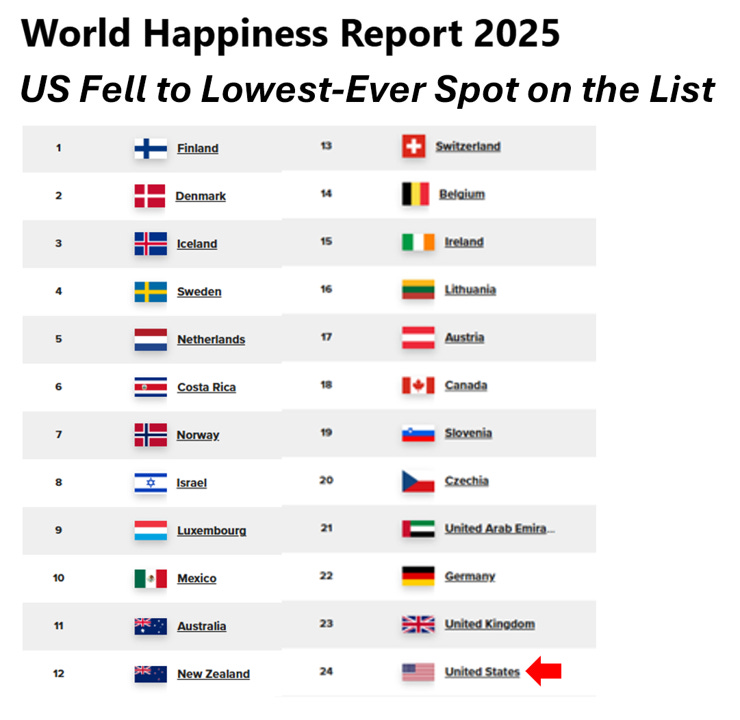Not-So-Happy (A Report)
Gallup’s newly released 2025 World Happiness Report offers insight into global well-being—and a few tough truths for the U.S., which dropped to its lowest-ever ranking at #24.
What’s behind the slide? It's not economics. It's disconnection. From solo dining to eroding trust, the data points to something more fundamental: we are becoming more isolated, and it’s taking a toll on our collective happiness.
For culture leaders, this is more than a social observation—it’s a strategic signal. The report emphasizes that the most meaningful contributors to happiness are trust, social support, and shared purpose. In short: the stuff of great workplace culture. In organizations where people feel seen, connected, and aligned to something bigger, they’re not just more engaged—they’re happier, healthier, and more resilient.
As leaders, we can't control global rankings. But we can shape the environments where people spend most of their waking hours. And that starts with how we communicate, lead, and design culture.
The 2025 World Happiness Report, published by the Wellbeing Research Centre at the University of Oxford in partnership with Gallup and the UN Sustainable Development Solutions Network, offers several key insights into global well-being.
Key Takeaways:
1. Finland Maintains Top Spot: Finland was ranked the happiest country for the eighth consecutive year.
2. United States' Decline: The United States fell to its lowest-ever position, ranking 24th, down from 15th in 2023. Factors contributing to this decline include increased rates of solo dining and a rise in "deaths of despair" from suicide, alcohol abuse, and drug overdose.
3. Importance of Social Connections: The report emphasizes that happiness is deeply rooted in trust, kindness, and social connection. Sharing meals, for instance, is linked to higher levels of life satisfaction and emotional health, surpassing the impact of income or employment status.
4. Global Trends: The report highlights a global surge in benevolent acts, such as helping strangers, especially during the COVID-19 years, which continued in subsequent years.
5. Young People Struggle: 19% of young adults across the world reported having no one they could count on for social support. This is a 39% increase compared to 2006.
How Gen AI Could Change the Value of Expertise
“19% of workers are in fields where gen AI is likely to take on tasks that demand technical knowledge today, thereby opening up more opportunities to those without hard skills”
Why Americans Are Working Less
“Gallup finds that average hours worked have dropped progressively since 2019 when U.S. employees reported working an average of 44.1 hours. In 2024, they work 42.9 hours per week.”
The MetroCard Goes the Way of the Token as M.T.A. Announces End of Sales
The end of an era.
Will the Viral Morning Routine Guy Be the End of Hustle Culture? Here's Hoping
This post sponsored by Saratoga Water.
The Big Fat Windsor Knot Takes Washington
Rembrandt to Picasso: Five ways to spot a fake masterpiece
Culture Edit Podcast
Ep. 083 – Brendan Quirk, CEO of USA Cycling and Founder of CompetitiveCyclist.com
This week, we’re joined by Brendan Quirk — CEO of USA Cycling and founder of CompetitiveCyclist.com, the largest online cycling retailer in the U.S. In this insightful and wide ranging conversation, Brendan shares stories from his hometown rides in Little Rock, weighs in on America’s growing dominance in international cycling, Olympic medal goals for 2028, and we discuss how collegiate programs are an important but complicated part of USA Cycling. We also dive into the origin story of Competitive Cyclist, the strategies behind its explosive growth, and Brendan’s take on why today’s entrepreneurs may be chasing the wrong goals.




